The Eastern Cape and in particular Port Elizabeth is facing an imminent water crisis (June 2022). If no good rains fall soon, forecasts show that some areas of the city will have their taps running dry in 50 days’ time or even sooner.
Water is the building block of life.
Allah Ta’ala tells us in the Noble Quran 21:30 that He created all living things from water. The earth was lifeless and the skies were not giving rain in the early days of the creation of the world. Then rain started and vegetation flourished through which creatures got their sustenance. Water is a means of life. All things rely on water for survival and most have water in their makeup:
- 70% of the human body is water, the brain and heart are 73% water, the lungs 83% and even the bones are 31% water.
- Water covers 70% of the earth’s surface. Water is liquid gold and water conflict has raged through history with sides fighting for control of water sources.
- Water is also critical in everyday items in ways we might not know. Hidden water is the millions of litres that go into the manufacturing of consumer goods. Paper, plastic, metal and fabric all require water to manufacture.
A car requires 75,000 litres to manufacture, while a smartphone needs 12,000 litres – each component requires water in the manufacturing process. A t-shirt needs 2,500 litres while even oil requires 8 litres to every 1 litre or so of fuel to refine.
Water in the Hereafter
Water will also be found in the Hereafter and will form an important part of the settings of Paradise. The Noble Quran describes the gardens of Paradise as having water flowing beneath them. In facr, even before we enter Paradise, we will be greeted with the water of the pond of Kauthar. Each Prophet will have his own pond of water to quench the thirst of his nation. The largest will be Kauthar, the pond of Prophet Muhammad sallallahu alaihi wa sallam. It will be as large as 700 km, whiter than silver, smell superior to musk, taste sweeter than honey and once you drink from it you will never be thirsty again. Two streams from Paradise flow into it. (Muslim)
Highlighting the importance of water in our lives, the Noble Quran draws our attention in several verses to water being sent down from the skies as rain. The vegetation depends on this water for survival and in turn creatures as well.
The water cycle and the way it is structured, is designed to make us acknowledge that the true Controller is Allah Ta’ala:
- We are taught to make dua for rain. The Prophet sallallahu alaihi wa sallam would pray, “Oh Allah, grant us rain.” He would at times make dua in the Friday sermon, and at other times would lead the people in Salatul Istisqa, or the prayer for rain. He would pray, “Oh Allah, grant us abundant rain, rain which fertilises the land, rain without delay.” (Abu Dawood).
- When the winds blew, which is one of the signs that rain clouds could be on the way, the Prophet sallallahu alaihi wa sallam would pray, “Oh Allah, grant me the good of the wind, the good in it and the good it brings. And save me from the evil of it, the evil in it and the evil it brings.” (Muslim)
- When the rains would fall, he would pray, “Oh Allah grant us beneficial rain.” (Bukhari)
- When there would be severe rain, and we can see the devastation this can wreak, he would pray for the rain to go around the city rather than on it, and that it fall in the places where it would benefit the most, in our case the catchment areas, etc.
- If it thundered he would pray for protection, “Oh Allah, do not kill us through Your Anger, nor destroy us with Your Punishment, but save us before that.” (Bukhari)
- After the rain had fallen, he would pray, “We have been given rain through the Grace and Mercy of Allah Ta’ala.” (Bukhari)
These are just some of the duas associated with rain. What we understand from here is our complete dependence on Allah Ta’ala for the rain which we need for survival, from the very beginning of the cycle till the end.
There are two Sunnats that we can practice on at the time of rain:
- The Prophet sallallahu alaihi wa sallam would let some of the drops of rain fall directly on to his noble body to take blessing saying that they have recently come from my Lord. (Muslim) This is encouraged for the first rain of the season according to the Shafi scholars. After a drought, the Prophet sallallahu alaihi wa sallam would let the rain drip onto his noble face and beard. (Bukhari)
- It is an opportune moment to make dua at the time of rain. The Hadith informs us that two duas are not rejected, the dua at the time the Athan is called, and the dua at the time of rain. (Mustadrak) Plan your duas to especially coincide with these moments of acceptance.
Once we get the water, we need to show gratitude for it. Again the Sunnah is the key:
- Sit and drink water or eat food. (Muslim)
- Recite Bismillah before drinking. (Bukhari)
- Drink with the right hand. (Bukhari)
- Drink in sips of three or more in odd number. (Bukhari)
The second component of gratitude is not to waste water. The hadith tells us not to waste water for a good deed like Wudhu even if we are on the banks of a fast flowing river. (Tirmidhi) Practicing on this, and the Sunnah number of times for washing of each limb is extremely effective in combating the whispers of Walahaan, the devil present at the time of Wudhu who tries to make us doubt if we have washed properly. (Tirmidhi) Don’t entertain these doubts, nor spending time debating or analysing them.
The third component of giving thanks for the water is not to pollute it. We are forbidden from urinating in stagnant water. (Muslim) Water conservation is a laudable and praiseworthy act in Islam. The Prophet sallallahu alaihi wa sallam would use 1,25 litres of water for Wudhu and 5 litres for a bath, sometimes more, sometimes less. Our taps run at 6 litres a minute!
One of the Sunnah ways to enjoy water is in the form of Nabiz.
This was a favourite drink of the Prophet sallallahu alaihi wa sallam. It is made by soaking either raisins or dates in water overnight. This should not be soaked longer than 12 hours or it will begin to ferment. It makes a refreshing, energizing sweet drink. You can drink the water and eat the dates or raisins, or blend them together and drink the mixture. We should drink this occasionally at least with the intention of following the Sunnah.
Some of the rivers of this world have their origins in Paradise. “The Euphrates and the Nile are from among the rivers of Paradise.” (Hadith) Some scholars opine that like how we have our origin in Paradise, so too do these rivers.
The best water on the face of earth is Zam Zam. It is a nourishing food and a healing for illness. (Al Mujam al Kabeer) This well in Makkah Mukarramah, which has served millions of litres of centuries with no need for any purification system can be drank while standing.
Prophet Musa alaihis salaam was given several miracles related to water. He was placed into the river as a baby by his mother and was saved, he struck a rock and twelve streams flowed from it for the Israelites, and he struck the sea with his stick and it split open for the Israelites to be saved from Pharaoh.
When we go through a drought, we need to analyse and understand why it happens, and why rain is withheld.
- When a nation is deceitful in business practises they will be afflicted with famine, price hikes and an oppressive leader. (Mustadrak) This indicates a possible reason for our drought, high cost of living and incompetent, corrupt government.
- When a nation does not pay its Zakaat, they will be deprived of rain. (Mustadrak)
- We are deprived of sustenance in general on account of committing sins wilfully, openly and persistently. (Ahmad)
- When adultery and extra marital relations become a general practice in any community, they are plagued with drought as a punishment. (Ahmad)
We need to collectively turn to Allah Ta’ala in making amends for our sins, and turning our backs on our old lives of sin.
Some ways we can benefit from water in this world and the next:
- Providing people with water is the best charity. (Abu Dawood)
- The Hadith tells us, “Protect your wealth by discharging your Zakaat, treat your sick through charity, and prepare for calamities in advance by engaging in Dua.” When someone in the family gets sick, then while resorting to medical treatment and reciting the Noble Quran, we should also give charity. One effective form of charity would be to provide water to those in need.
- Gifting water is a way of securing continuous reward for someone who has passed away. Sa’ad ibn Ubadah radhiallahu anhu’s mother passed away. When he asked the Prophet sallallahu alaihi wa sallam what charity would be best, he was told providing water. As a result he built a well in his mother’s name. (Abu Dawood)
- Water can be a means of sins being forgiven. A prostitute was forgiven for giving a thirsty dog water to drink from a well. (Bukhari). Imagine the effectiveness in giving water to human beings in need.
- Water can be a means of sharing in someone’s reward. When you feed someone a drink of water at the time of breaking his fast, you get the reward of his fast while he also loses nothing. We need to look for opportunities to share in the reward of others by assisting them in carrying out those acts.
Water is used in many thought-provoking examples:
- “The example of the Muslim nation is like the rain. It is uncertain if the first of it or the last of it is better.” (Tirmidhi) This does not mean that the latter generations are better than the Sahaba radhiallahu anhum, but that like how the first of them spread benefit by conveying Islam, so too will the last.
- The Prophet sallallahu alaihi wa sallam used the example of a river running outside one’s house. If a person bathed in it five times a day, no trace of dirt will remain on him. In a similar manner, if a person performs his five daily Salaah, it will remove all traces of sin from him. (Bukhari)
- Moulana Rumi rahimahullah said, “Be like the night in concealing other people’s faults, and have generosity like running water which gives to all.”

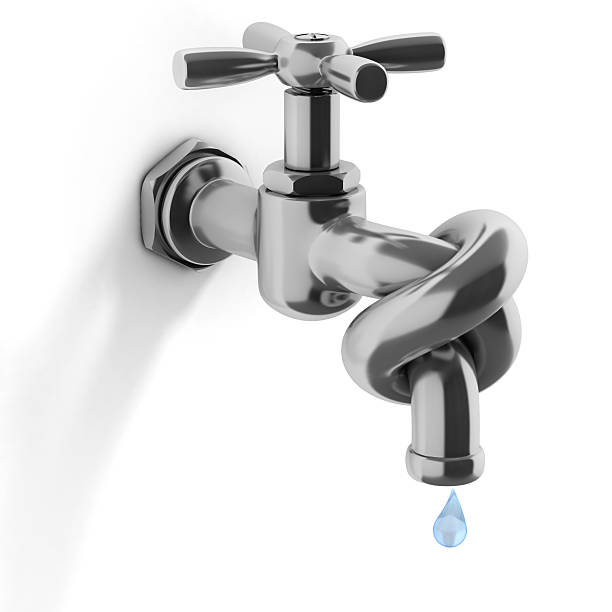
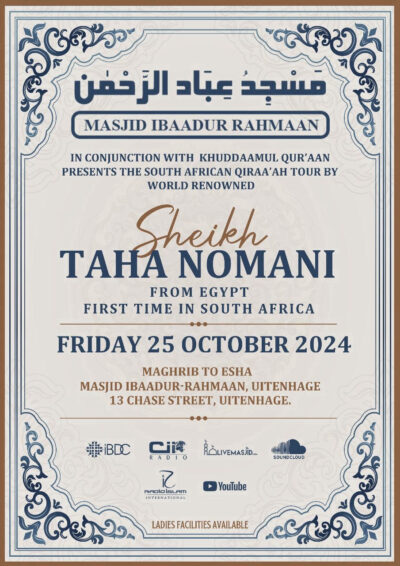



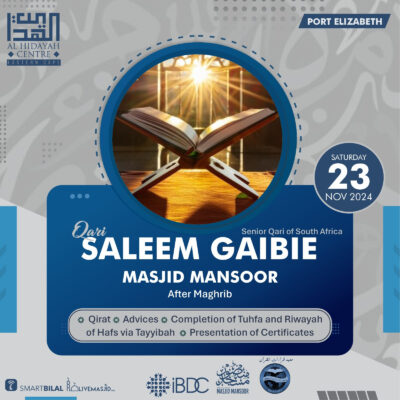
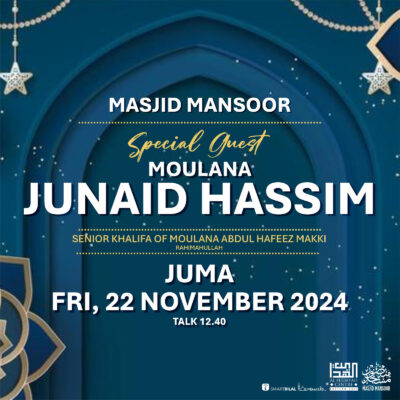
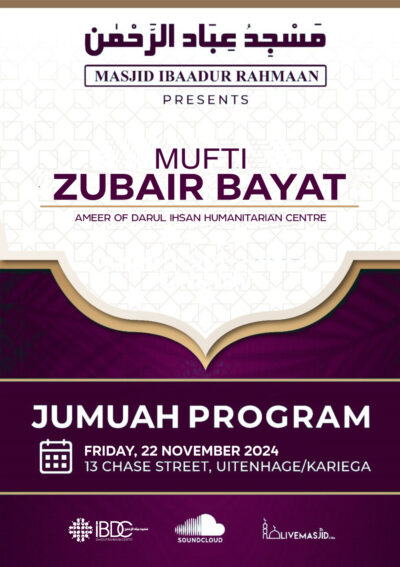
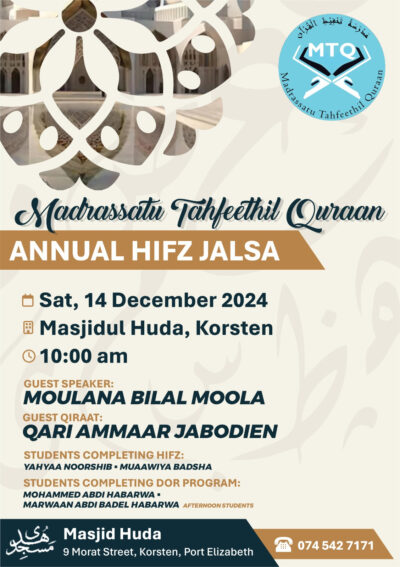



COMMENTS